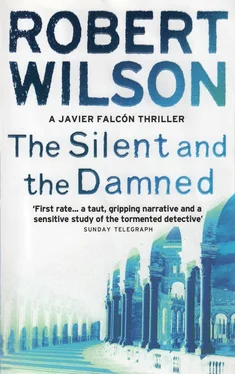'The CIA were only examining these documents in the light of Sr Krugman's behaviour and claims. I know they have a file on Miguel Velasco because of his actions in the Pinochet administration. If there's anything else it would, of course, be classified.'
'Your response has been very rapid and thorough,' said Falcón.
'They pride themselves on it,' said Flowers. 'Since 9/11 there have been changes in the Service, especially on reaction time to all inquiries in which there is a reference to that date, even if it did refer to 1973.'
'I added a summary of the Vega case to the statements,' said Elvira. 'For the purposes of clarification.'
'It was very helpful, Comisario,' said Flowers.
'What would be the reaction from the CIA if we could provide photographic proof that meetings had occurred between Sr Krugman and… US government officials?' asked Falcón, who was finding Mark Flowers to be rather too amicable and gracious.
'Extreme surprise, I would imagine,' said Flowers, whose face remained completely impassive.
'As you know, Sr Krugman's wife was a well-known and active photographer who particularly enjoyed taking shots of people down by the river, which was where her husband said he had meetings with code name "Romany".'
Flowers blinked once but said nothing. He handed Elvira his card and left.
'Do you have photographic evidence?' asked Elvira.
'No, Comisario,' said Falcón. 'It's just a way of terminating a line of inquiry. If Sr Krugman was a fantasist, we'll never hear from Mark Flowers again. But if he was supplying information there will be some anxious people in the consulate. I'd be interested to hear if you receive communication from a higher authority.'
Elvira's phone rang. Falcón got up to leave. Elvira stayed him with his hand. The Comisario listened, made notes and hung up.
'That was a senior officer from Aracena,' he said. 'He's just been informed by the fire department that the forest fire raging around Almonaster la Real in the past few days was an arson attack, and that they have now traced the start of the fire to an isolated finca which belonged to Inspector Jefe Alberto Montes. The contents of the house have been almost completely destroyed, but they have found a rudimentary timer, which they believed was attached to an incendiary device that ignited a large quantity of petrol.'
Tuesday, 30th July 2002
It was still brutally hot outside the city, which crouched in a haze behind Falcón like a beast in its own fetor, but the openness of the rolling plain ahead of him, the swaying brown grasses, the distant hills, made him feel free of the discomfort of his own body. The temperature dropped as he drove through the sierra and, although it never reached below blood heat, the sense of release from the city's feverish concrete into the high greenery of the chestnut trees induced a mild delirium. Or was it Elton John singing 'Benny and the Jets' on the radio?
It was impossible to think that anything terrible could happen out here. Whereas the city drew the poor, the lost, the corrupted and the depraved to the mangled teat of its bristly underbelly, this country seemed untouched. The jostling leaves of the trees filtered the sunlight to the pure, dappled memory of less confused times. Until Falcón turned off the main road to Almonaster la Real.
The charcoal stink of torched forest reached him before the sight of blackened stumps and scorched, defoliated trees with their bark-flayed arms stretched out in the distress of serious burn victims. The forest floor of black-and-grey coals still smouldered, as if panting from the devastating consumption. The white sky provided a pitiless backdrop, as if to emphasize to those doubters who passed through this monochromatic horror that what had happened here was as wrong as war.
The police and firemen he met in the local bar in Almonaster were grim and the townspeople shocked and in despair, as if they were the survivors of some wartime atrocity. They knew things that Falcón, as yet, didn't.
He was led down to the finca, which was several kilometres outside the town and isolated in the forest. There was a kilometre of rough dirt track up to the house, whose windowless, roofless, blackened shell looked like a giant, stoved-in human skull.
Everything wooden in the house had been consumed. The first floor no longer existed. It had burnt or collapsed under the weight of the falling roof on to the concrete below. The ground floor was piled with black terracotta roof tiles, charred beams and furniture, smoking mattresses, screenless televisions and pools of molten, but now hardened, plastic.
They took him down through the concrete floor into the basement, which was badly scorched but intact. It didn't look like any basement he'd ever seen. There were four metal doors, two on either side of a short corridor. The doors had bolts on the outside, which could also be padlocked. None of the rooms had windows. All had burnt wooden pallets and mattresses. They were cells in which people had been kept.
In one of the cells, whose walls were unplastered, revealing the original stone, there was some writing scratched on to a rock in the corner by the bed. It was in Cyrillic script. An enamelled metal plate lay upside down on the floor.
They led him back upstairs and out on to the land whose grass had been burnt off, leaving a bald stretch of black and brown beaten earth, which now looked like the hide of a diseased dog. At the edge of the land, inside what would have been the tree line, were two piles of earth.
'With the forest burnt down we could see these two humps,' said the officer. 'We dug down about a metre and found these -'
Falcón looked down on the skeletal remains of two people nestled in the dark earth.
'We didn't want to dig further until we had proper forensics here, but the local doctor measured them and thinks that they are a boy and a girl of around twelve or thirteen years of age. He thought that they'd been buried for between eight months and a year, given that there is no tissue left.'
'What do you know about how this house was being used?' asked Falcón, needing to get something out, because his rage was reaching uncontainable levels.
'Weekends only and not every weekend. Friday and Saturday nights, mostly.'
'Did you ever meet the owner?'
'Inspector Jefe Montes? Of course. He came and said hello to us. He said he'd bought the house and that some friends were going to do it up and use it as a hunting lodge.'
They walked back to the house and Falcón could see that there were air-conditioning units for the lower and upper floors.
'So they came in the summer as well?' said Falcón, pointing at the blackened boxes.
'Not to hunt, obviously,' said the officer. 'In the end, they didn't do much hunting at all… We didn't think I much about it at the time. And, because Inspector Jefe Montes was the owner, we didn't think anything…'
The officer's voice trailed off. 'Illegal' seemed an ineffective word to describe what had gone on in this house of horror.
'Whoever started this fire had to bring a great deal of petrol up to the house,' said Falcón. 'They probably used plastic jerry cans and they'd have needed a pickup. Can you contact every petrol station in this area and… well, you know what to do.'
Falcón called Elvira and gave him a report. He asked for Felipe and Jorge to be sent out with a change of clothes, because they were certainly going to have to spend the night. He also asked for some manpower to phone around the petrol stations in the Seville area, looking for a pick-up with probably two people who'd filled possibly ten plastic jerry cans with petrol, late Saturday night or very early on Sunday morning. He hung up and told the officer that the area was to be cordoned off and kept under guard. Nobody was to touch anything on the property until the forensics arrived. He checked the air-conditioning boxes on the ground floor but didn't find what he was looking for. He asked for a set of ladders. A car was dispatched to town. Falcón stood in the blackened landscape and drew fury from the destruction.
Читать дальше
Конец ознакомительного отрывка
Купить книгу












